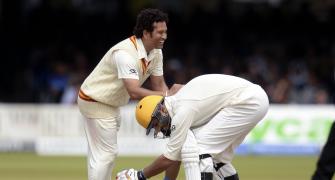The nearly year-long trial of eight suspects at the International Crimes Tribunal in Bangladesh, who have been accused of war crimes during the 1971 war, may not have made headlines in India, but it is attracting huge international attention and further polarising the country's politics.
On Wednesday, Prime Minister Sheikh Hasina, while addressing a massive rally in Dhaka for her Awami League supporters, accused the opposition Bangladesh Nationalist Party of attempts to stall the trial.
"They (BNP) have gone crazy following the start of trial of the war criminals. You (BNP) cannot save war criminals. The trial will be held on the soil of Bangladesh," Prime Minister Hasina said.
The ruling party's rally came four days ahead of a BNP procession planned for March 12.
At the centre of this show of strength by Bangladesh's two principal political parties is the controversial War Crimes Trial that started almost two years ago.
The government constituted the International Crimes Tribunal on March 25, 2010, to try people involved in crimes against humanity during the War of Liberation with Pakistan in 1971.
The ICT is currently trying eight leaders of the Jamaat-e-Islami and main opposition BNP on charges of murder, arson, loot, rape and other crimes.
But the ICT's mandate and its functioning have come under increasing international scrutiny on charges of unfairness and arbitrary nature of its rules.
Among the most prominent people to go on trial is a former head of the Jamaat-e-Islami, Ghulam Azam, now 90, on trial for crimes against humanity committed more than 40 years ago.
The country's war crimes tribunal believes he collaborated with Pakistan's army, orchestrating mass killings during Bangladesh's 1971 War of Liberation with Pakistan.
The ICT has, however, drawn widespread criticism for failing to meet international legal standards. The UN working group on arbitrary detention has now added its voice to that growing chorus.
It examined the cases of Motiur Rahman Nizami (former minister of agriculture), Abdul Quader Molla, Mohammad Kamaruzzaman, Ali Hassan Mijahid, Allama Delewar Sayedee and Salbuddin Chowdhry, and found their detention to be in violation of human rights. The six men had applied for bail on April 21, 2011, on the grounds that they were being arbitrarily detained without charges during the pre-trial proceedings.
However, Shaufiq Ahmed, the Bangladesh law minister, has in the past rejected the accusation.
"This tribunal is not an international war crimes tribunal, this is a domestic tribunal," he said. "Those who have been arrested are facing trial, so it is not an illegal detention."
The law minister, concerned over the rising voices in international arena against violations of "principles of natural justice," in fact said on Tuesday that the government has recently issued directives to Bangladesh missions in several countries to take measures against the ongoing anti-war crimes trial campaign abroad.
"Those who don't want the trial of war criminals are creating confusion outside the country by spending money through their agents. The embassies abroad have already been asked to take necessary steps against the move," barrister Shafique Ahmed told reporters.
"Stern action will be taken if anyone tries to spread misleading information even inside the country," he warned.
International groups have commented on the suspension of constitutional rights for the accused over the denial of their access to international lawyers.
While some have been incarcerated without charge, others face charges which are unsubstantiated, these groups said. Ghulam Azam, for instance, now stands accused of "responsibility for all atrocities committed across the country from March 25 to December 16, 1971."
Defence lawyers for several accused have appealed to the Bangladesh government for a fair trial and said, "We hope that the government will remedy the situation and ensure compliance with all recognised norms of international law. We therefore call upon the government to ensure that the opinion of the UN working group is implemented without delay."
Clearly, as the general elections draw near (slated for December 2013), trading of charges between the ruling Awami League and the BNP is bound to increase, especially on the issue of bringing the alleged perpetrators of war crimes in 1971 to justice.






